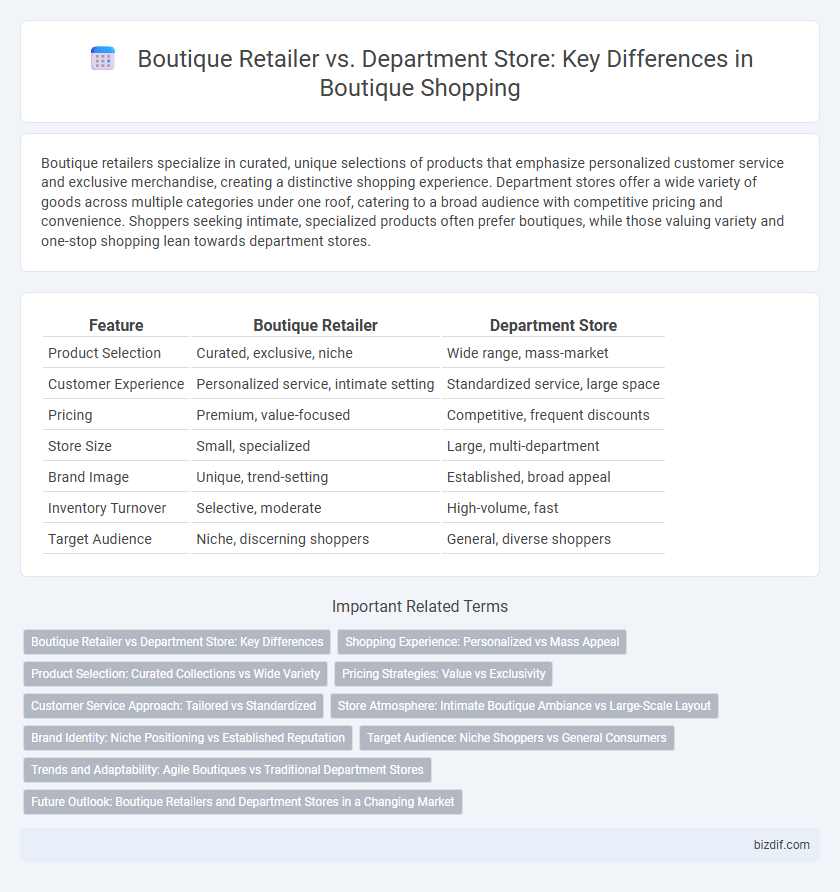Boutique retailers specialize in curated, unique selections of products that emphasize personalized customer service and exclusive merchandise, creating a distinctive shopping experience. Department stores offer a wide variety of goods across multiple categories under one roof, catering to a broad audience with competitive pricing and convenience. Shoppers seeking intimate, specialized products often prefer boutiques, while those valuing variety and one-stop shopping lean towards department stores.
Table of Comparison
| Feature | Boutique Retailer | Department Store |
|---|---|---|
| Product Selection | Curated, exclusive, niche | Wide range, mass-market |
| Customer Experience | Personalized service, intimate setting | Standardized service, large space |
| Pricing | Premium, value-focused | Competitive, frequent discounts |
| Store Size | Small, specialized | Large, multi-department |
| Brand Image | Unique, trend-setting | Established, broad appeal |
| Inventory Turnover | Selective, moderate | High-volume, fast |
| Target Audience | Niche, discerning shoppers | General, diverse shoppers |
Boutique Retailer vs Department Store: Key Differences
Boutique retailers specialize in curated, unique product selections with personalized customer service, targeting niche markets and fostering brand loyalty. Department stores offer a broad range of merchandise across multiple categories, emphasizing convenience and wide product availability under one roof. The boutique experience prioritizes exclusivity and customer engagement, while department stores focus on variety and scale.
Shopping Experience: Personalized vs Mass Appeal
Boutique retailers offer a highly personalized shopping experience tailored to individual customer preferences, often featuring curated selections and attentive customer service. Department stores focus on mass appeal by providing a wide variety of brands and products under one roof, catering to diverse consumer needs with standardized service. This contrast highlights boutiques' emphasis on exclusivity and customer connection versus department stores' convenience and broad product availability.
Product Selection: Curated Collections vs Wide Variety
Boutique retailers specialize in curated collections that emphasize unique, high-quality, and often exclusive products tailored to a specific market niche, enhancing the shopping experience through personalized and distinctive offerings. Department stores provide a wide variety of products across multiple categories, allowing customers to find diverse brands and styles under one roof, catering to broad consumer needs and preferences. The focused product selection in boutiques contrasts with the extensive assortment in department stores, defining their distinct retail strategies and customer appeal.
Pricing Strategies: Value vs Exclusivity
Boutique retailers emphasize exclusivity through limited-edition products and personalized service, enabling premium pricing that targets niche markets willing to pay more for unique items. Department stores leverage value pricing strategies by offering a diverse range of brands and frequent promotions to attract price-sensitive customers seeking variety and affordability. The contrasting pricing approaches reflect boutiques prioritizing curated luxury experiences, whereas department stores compete on volume and accessibility.
Customer Service Approach: Tailored vs Standardized
Boutique retailers excel in providing tailored customer service, offering personalized shopping experiences and expert product recommendations that cater to individual preferences. Department stores typically implement standardized service protocols designed to efficiently manage large customer volumes, resulting in less personalized but consistent interactions. This difference shapes customer loyalty, with boutiques fostering deeper connections through customized attention, while department stores prioritize broad accessibility and convenience.
Store Atmosphere: Intimate Boutique Ambiance vs Large-Scale Layout
Boutique retailers create an intimate boutique ambiance with carefully curated decor, personalized customer service, and limited product selections that foster a unique shopping experience. Department stores feature a large-scale layout with expansive floor space, multiple departments, and high foot traffic that emphasize variety and convenience over personalization. The contrasting store atmosphere impacts customer engagement, with boutiques encouraging deeper connections and department stores supporting broad accessibility and product range.
Brand Identity: Niche Positioning vs Established Reputation
Boutique retailers thrive on niche positioning by offering curated, unique products that reflect a distinct brand identity tailored to specific customer segments. Department stores rely on an established reputation, leveraging a broad product range and trusted brand history to attract diverse shoppers. This contrast shapes consumer perception, with boutiques emphasizing exclusivity and personalized experience, while department stores focus on reliability and variety.
Target Audience: Niche Shoppers vs General Consumers
Boutique retailers cater to niche shoppers seeking exclusive, carefully curated products that reflect unique styles and preferences, often emphasizing personalized service and limited inventory. Department stores target general consumers by offering a broad range of products across multiple categories, providing convenience and variety under one roof. This distinction in target audience influences the shopping experience, product selection, and marketing strategies between the two retail formats.
Trends and Adaptability: Agile Boutiques vs Traditional Department Stores
Boutique retailers excel in agility by quickly responding to fashion trends and customer preferences, often updating inventory with niche and exclusive products. Traditional department stores face challenges in adaptability due to their larger scale and complex supply chains, making rapid trend shifts more difficult. This flexibility allows boutiques to create personalized shopping experiences, attracting trend-conscious consumers seeking uniqueness over mainstream offerings.
Future Outlook: Boutique Retailers and Department Stores in a Changing Market
Boutique retailers are poised to thrive by leveraging personalized customer experiences and niche product offerings that cater to evolving consumer preferences for exclusivity and sustainability. Department stores must innovate through omnichannel strategies and curated assortments to remain competitive amid growing e-commerce dominance and shifting shopper behaviors. The future market landscape favors agility, with boutique retailers capitalizing on brand loyalty and department stores enhancing digital integration to meet dynamic retail demands.
Boutique Retailer vs Department Store Infographic

 bizdif.com
bizdif.com